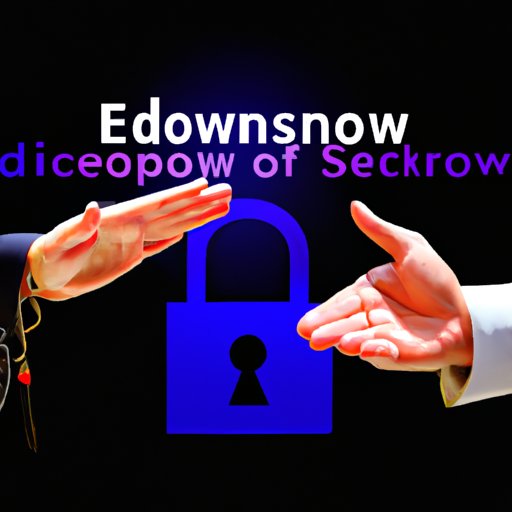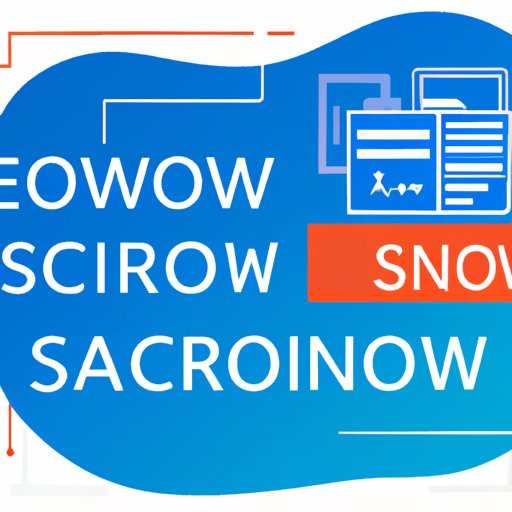Introduction
Escrow is a financial tool that helps to secure payments and protect both buyers and sellers. It involves placing funds, documents, or other items of value in the hands of a third party (the “escrow holder”) until certain conditions are met. In this way, it ensures that both parties meet their obligations as agreed upon in the contract. But how exactly does escrow work? This article will provide a comprehensive guide to understanding escrow and how it can be used in different types of transactions.
Explaining Escrow: A Step-by-Step Guide
To understand how escrow works, let’s first take a look at what an escrow account is and how it works:
What is an escrow account?
An escrow account is a special type of bank account that holds money or assets on behalf of two parties who are involved in a transaction. The escrow holder, which is typically a neutral third party such as a bank, attorney, or title company, acts as a trustee for both parties. The escrow holder is responsible for holding and disbursing funds according to the terms of the agreement between the two parties.
How does an escrow account work?
The process begins when one party deposits funds into the escrow account. These funds can include money, stocks, bonds, or other assets. Then, the escrow holder verifies that all the necessary documents and conditions have been met before releasing the funds to the second party. Once the transaction is complete, the escrow holder releases the funds to the second party and closes the escrow account.
Types of escrow accounts
Escrow accounts can be used in many different types of transactions, including real estate purchases, business deals, and online purchases. Each type of escrow account has its own set of rules and regulations. For example, real estate escrow accounts are governed by state laws, while online escrow accounts are governed by federal regulations.

The Basics of Escrow for Beginners
Escrow can be a useful tool for both buyers and sellers. Here are some of the advantages and drawbacks of using escrow:
What are the advantages of escrow?
Using escrow can provide a number of benefits. It increases trust between the two parties, since the escrow holder is a neutral third party. It also reduces the risk of fraud, since the escrow holder verifies that all necessary conditions have been met before releasing the funds. Finally, it adds an extra layer of protection for both parties, since the escrow holder is responsible for ensuring that all terms of the agreement are met.
What are the drawbacks of escrow?
The main drawback of using escrow is the cost. Most escrow accounts require a fee, which can range from a few dollars to several hundred dollars. Additionally, there may be additional fees associated with closing out the escrow account. Finally, there is always the risk that the escrow holder may not be able to fulfill its duties properly.
How to Use an Escrow Service
Now that you have a better understanding of escrow, here are some tips for setting up and using an escrow service:
Setting up an escrow account
Before you can use an escrow service, you need to set up an account. You can do this by selecting a reputable escrow provider (such as a bank, lawyer, or title company). Be sure to read all the terms and conditions carefully before signing any agreements.
Making deposits and withdrawals from escrow
Once the escrow account is set up, both parties can make deposits and withdrawals as needed. The escrow holder will verify that all conditions have been met before releasing the funds to the other party.
Closing out an escrow account
When the transaction is complete, the escrow holder will close out the account and release any remaining funds to the appropriate parties. Depending on the escrow provider, there may be additional fees associated with closing out the account.

Understanding Escrow in Real Estate Transactions
Escrow is often used in real estate transactions. Here’s a brief overview of how it works in these situations:
What is an escrow agreement in real estate transactions?
In a real estate transaction, an escrow agreement is a document that outlines the terms and conditions of the sale. This agreement includes information about the buyer, seller, property, and all other relevant details. The escrow holder is responsible for verifying that all conditions of the agreement have been met before releasing the funds.
What are the steps in a real estate escrow process?
The steps in a real estate escrow process vary depending on the specific transaction. Generally, however, the process involves opening the escrow account, depositing the funds, verifying the documents and conditions, and then closing out the account once all parties have fulfilled their obligations.
What You Need to Know About Online Escrow Services
Online escrow services are becoming increasingly popular, as they offer more convenience and security than other methods of payment. Here’s what you need to know about using online escrow services:
What is an online escrow service?
An online escrow service is an online platform that allows users to securely transfer funds and assets between two parties. The platform uses encryption technology to ensure that the funds are protected, and the escrow holder is responsible for verifying that all conditions of the transaction have been met before releasing the funds.
Benefits of using an online escrow service
Using an online escrow service offers a number of benefits. It’s fast and convenient, since the funds can be transferred quickly and securely. It’s also more secure, since the platform uses encryption technology to protect the funds. Finally, it’s cost-effective, since most online escrow services charge lower fees than traditional escrow accounts.

Using Escrow to Protect Your Business Deals
Escrow can also be used to protect your business deals. Here’s how:
How can escrow protect your business deals?
Escrow can provide an extra layer of protection for your business deals by ensuring that both parties fulfill their obligations as outlined in the agreement. By using escrow, you can rest assured that both parties will follow through on their commitments, since the escrow holder is responsible for verifying that all conditions of the agreement have been met before releasing the funds.
Examples of how escrow can be used to protect business deals
Escrow can be used in a variety of business deals, such as mergers and acquisitions, joint ventures, and international transactions. For example, in a merger or acquisition, the escrow holder can ensure that the buyer pays the agreed-upon amount and that the seller transfers ownership of the company as outlined in the agreement.
Conclusion
Escrow is a powerful financial tool that can be used to protect both buyers and sellers in a variety of transactions. It works by placing funds or assets in the hands of a third party, who is responsible for verifying that all conditions of the agreement have been met before releasing the funds. While there may be some costs associated with using escrow, it can provide an extra layer of protection for both parties and reduce the risk of fraud. Understanding how escrow works can help you make informed decisions and protect yourself in any type of transaction.
(Note: Is this article not meeting your expectations? Do you have knowledge or insights to share? Unlock new opportunities and expand your reach by joining our authors team. Click Registration to join us and share your expertise with our readers.)
